#HOW DID I GET TO THIS CONCLUSION????
Text
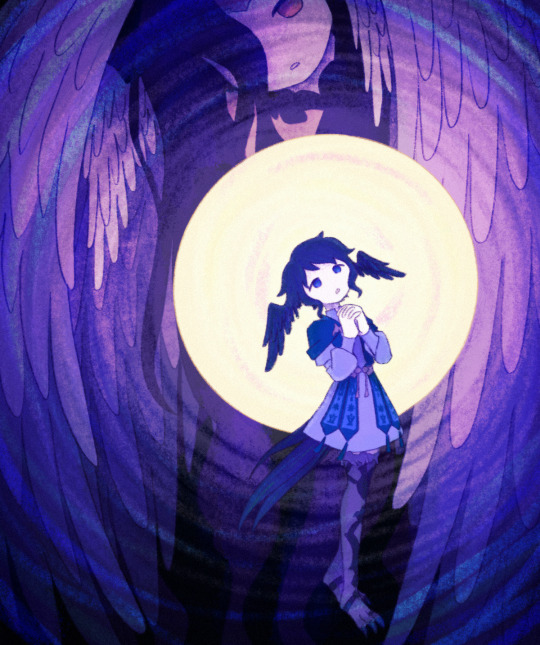
Song of Oblivion
#ooough my poor cataclysmic bird daughter#she loved so much and destroy everything for it#she denounces existance because to exist is to suffer- and suffering is her enemy#not realizing that in doing so she breeds so much of the suffering she hates#several of the fallen stars only fell because her question spurred them into a self-absorbing path#and then... and then the one singular meteia that realize her folly... who could be convinced of lifes meaning#by seeing you continue ever onwards even with your dearest friends' deaths on your shoulder#by seeing how everyone accepts oblivion for another tomorrow- even if they had suffered so much. even if they wanted to die#no matter what they fought. they fought and died and kept marching forward even in death#they loved life enough to sacrifice it. how could she not accept that?#and the realization that the reason she came to the conclusion she did was because she was flawed- bc hermes was flawed#as hermes said- he gave her wings to fly but did not teach her how to tread the earth#she was given freedom to experience the feelings and emotions of the world- but not the groundwork to understand it#she could see. she could hear. but she could not comprehend#she has knowledge- but without context it gets misinterperated and warped#OUGH im going to scream. i miss her.#meteion#endsinger#final fantasy#final fantasy 14#final fantasy xiv#ff14#ffxiv#art#my art#xanders art#digital art#fan art
205 notes
·
View notes
Text
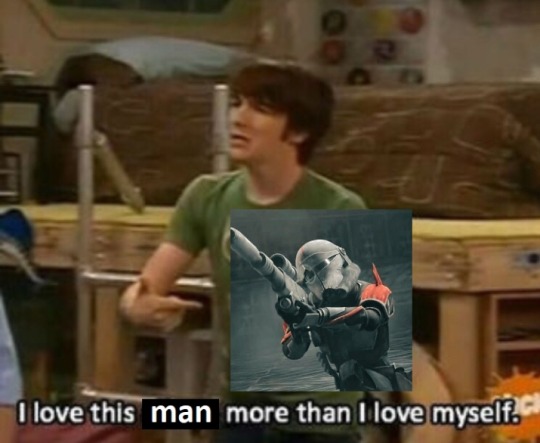
#and i get so mad when i see the worst possible take on him#like HOW in the world did you even come to that conclusion#unreal#tbb#crosshair
128 notes
·
View notes
Text
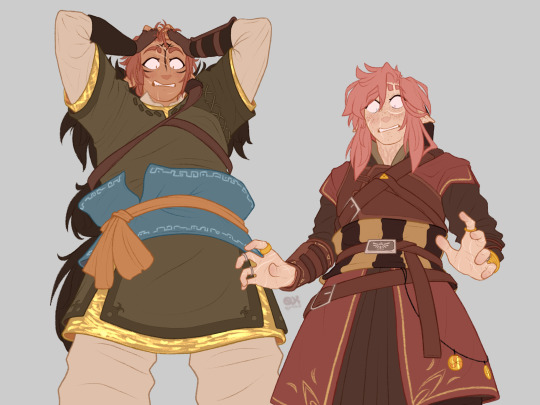
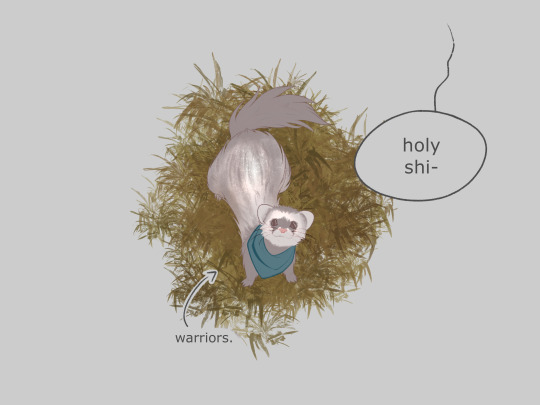
so i've seen a lot of people headcanon wars' hypothetical dark world form being some beautiful, majestic, possibly otherworldly creature
but hear me out.
#qkdraws#suncaster au#suncaster legend#suncaster briar#suncaster warriors#ferret wars#the legend of zelda#legend of zelda#tloz#loz#loz au#zelda au#i cannot explain how i came to this conclusion#all i can tell u is that it is correct.#GOD this was fun to draw actually. i already miss working on it and i put my ipad away like 2 minutes ago#did a First this time; i actually just randomly picked colors myself for twilight#shocking!!!!!!!!!!!!!!!!!!!!!!!!!!!!!!!!!!!!! what is ci doing!!!!!!!!!!!!!!!!!!!!!!!!!!!!!!!!! never been done before!!!!!!!!!!!!!!!!!!#i ran out of characters for exclamation points !!!!!!!!!!!!!!!!!!!!!!!!!!!!!!!!!!!!!!!!!!!!!!!!!!!!!!!!!!!#i like to put down shitty ass colors at first and then put as many layer filters as i need on top to get it to look right#and then i just . color pick each New color that i got from that and Study them all until they make sense#<- my learning process. <3#so i put layer filters on top of legend. and then Studied it. and then moved onto twilight and picked the colors myself#riveting story jay who cares#i learn a shit ton by doing that actually. very useful very fun#anyway enough of me being annoying . ferret warriors#i think my logic here was: ferret = silly. ............ my warriors: ...........Also silly#idk why i put so much time and effort into crack treated seriously but. we're here now#He's Just a Little Guy#Silly Little Dude
3K notes
·
View notes
Text
in case ur having trouble figuring out why using a news article of a singular person who happens to be a minority who did something really bad isnt good proof that the entire minority is evil. allow me to explain by way of this xkcd comic

#spitblaze says things#i just. do not know where tr/-anspho/-bes get off#posting one(1) article of some transfem lady who did something horrendously shitty#and then go 'well clearly this is how all of them are#thats a lie. i know how. its confirmation bias#if you gather enough individual news articles you could convince anyone of anything probably#every time i see te/-rfs doing that i wanna go 'ooh i can play this game too!'#and then post a bunch of articles of people getting killed by vending machines and drawing the conclusion#that vending machines are dangerous killers and we cant have them anywhere near children lest they turn into one themselves
3K notes
·
View notes
Text
TEST DRIVE TEST DRIVE TEST DRI-
I have so many thoughts about this entire sequence, from the way Hiccup and Toothless get along to the MUSIC- (the music analysis is going to my tags)
.
But im gonna talk about Toothless pov again
I always think of this is like, the forbidden friendship scene for Toothless the way the actual forbidden friendship was for Hiccup
If Hiccup's scene was Toothless connecting to Hiccup through human things (sharing food, smiling, art and all that)
Then this scene is Toothless' because Hiccup connects with Toothless through flying, something I've always headcanoned to be what dragons (the ones that fly anyway) need not just to survive, but to live and bond with others.
if Hiccup's FF is the beginning of the potential then Toothless' FF is the "end", the moment where the potential is found and fulfilled, the thing that really solidifies their friendship because both has now experienced and accepted the other's unique sides
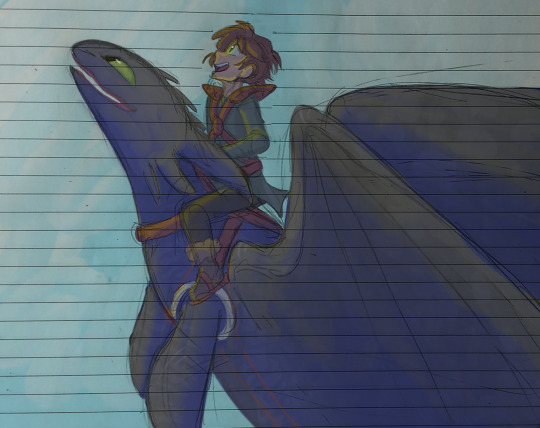
Just, yeah Toothless sees Hiccup just getting it, understanding why flying is so wonderful, hearing him cheer and whoop in joy like a fledgling's first time in the air, and seeing him at the end instinctively understand what to do-
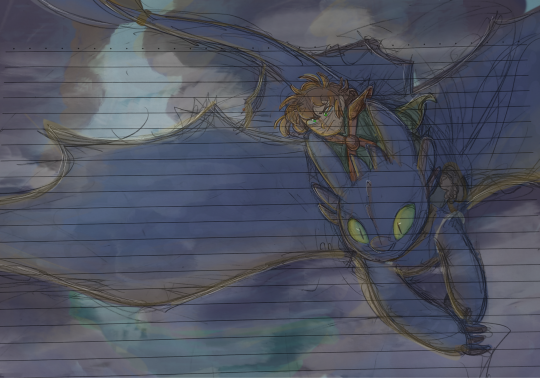
Like that sudden spin near the end of the sea pillars- and both of them looked surprised they even managed to do that together instinctively- when just a few minutes ago Hiccup couldnt even dodge the two very obvious sea pillars in the beginning
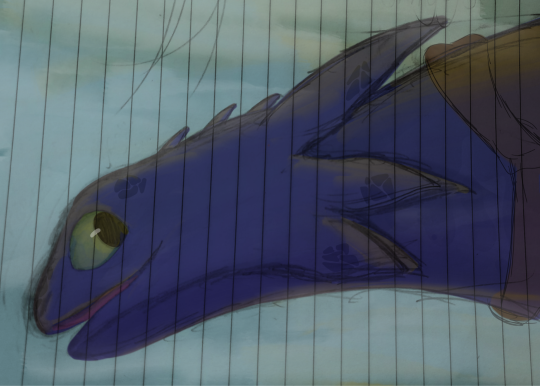
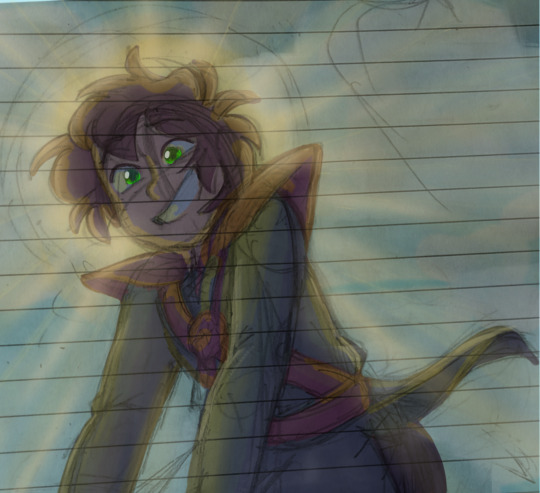
He looks up at this human, this strange clever, brilliant little human who has somehow made this even possible, who has broken every preconception he has, who is now flying with him with a dragon's instinct but baring his teeth in that human way of expressing joy, screaming something he could not parse perfectly in his dragon tongue but understood the meaning all the same.
"We did it."
#they did it. they achieved what they thought was impossible but together they reached it#the line can apply to a lot of things so ill let you think about it#i totally didnt get that 'we' thing from a fanfic COUGH#httyd#httyd movies#junie art post#can u tell ive gone insane#this was supposed to be a short caption but ive gotten carried away#toothless the dragon#toothless#hiccup horrendous haddock lll#hiccup#NOW. FOR THE MUSIC.#most of the analysis is already talked well by sideways and phoebe-kate so ill talk about my headcanons and interpretations#toothless' theme always repeats over and over. not ever really having a satisfying conclusion which ive always thought of as a silent show#that toothless was never really happy or content with his life before since he lived a dangerous and monotonous life of serving the queen#sure in exchange for his servitude he was given shelter to a place no viking can reach but he would never call it home.#he most likely wanted out of that sitaution. wanted something new and he got that rather violently through hiccup#now lets talk about hiccups theme. his theme is beautiful and sounds complete. but in the beginning you barely if ever notice his theme#unless youre really looking for it. his theme plays quite subtly and softly. showing how hiccup wants to be seen but he never is#at the start his theme plays after berk's which makes it sound as if hes following them. he isnt the same as berk but he tries to be#FF comes and hiccup and toothless connect both on screen and music. see you tomorrow has hiccups theme play clearly & confidently for once#test drive comes and toothless takes the lead- hiccup following right after him. it sounds amazing but theyre still not quite there yet#then the sea pillars moment and toothless theme plays twice waiting for hiccup's theme to jump in- to let go#and when hiccup does let go his theme jumps right after toothless' fitting perfectly and toothless' lets hiccup theme take center stage#its loud & beautiful and you get to hear it so clearly it takes your breath away and it ends with toothless theme finally reaching an end#they completed each other both musically and in character#they broke the rules of the world and are neither berk's theme or the dragon's they are two parts creating something new and beautiful#they completed their theme bros thats their theme its not berks or the dragons its their very own#okay im done i dont know if i got this across right i hope yall at least get the gist of my insane rambling
825 notes
·
View notes
Note
“one day im going to have to make like a three hour long video essay that's just called In Defense of Helluva Boss” Please do. I see more anti videos than I do with defense ones. Like the ones that say season 2 is terrible even though it’s barely completed and the ones that say Stolitz is a bad despite them barely having a relationship.
no literally i am sick of seeing more anti content than actual appreciation videos but the anti talking point i see most that drives me up the fucking walls is that it's "bAd RePrEsEnTaTiOn," as if that is all that queer people are allowed to have; just the vague nebulous concept of "Rep(TM)." the fact that if a straight character is a bad person then it's just that This Character is a bad person, but if a queer character is a bad person then This Is Bad Representation Of The Community And Is Homophobic. can we not just HAVE characters?? vehicles to tell a story??? tools to craft a compelling narrative??? this is part of why Helluva/Hazbin being adult shows is such a THING because i see this get shut down a lot under the guise of "uhh well just because it's an adult show doesn't mean that it can handle whatever topic it wants however it wants" and like. yeah buddy! that's true! and that's not what this is fucking about!! when people say "it's an adult show" what they mean is that it's made to be engaged with under the assumption that you would know better than to take information to shape your worldview and perception of other real life people from a fucking cartoon! the show doesn't NEED to tell you that Um Hey Guys Just So You Know This Isn't Actually Meant To Reflect How All Real Life Gay Relationships Are because you are an adult who should already be able to discern this.
"bad rep" doesn't mean "characters that are nuanced, morally gray, or just bad people." "bad rep" would be if helluva boss was a show that said "the REASON these characters are in toxic relationships / are bad people is BECAUSE they are queer, or at least directly correlated to that fact." which is. you know. very fucking different than "these characters are in toxic relationships / are bad people because they 1) live in a classist society that actively encourages them to be their worst selves and 2) are extremely traumatized."
#btw when i say toxic i DO mean stolitz but not in like. a 'this is romanticizing abuse !!!!1!!!!1!1!!' kind of way#which is. the second stupidest criticism of this show#like babe did you really watch blitz break down sobbing on his couch and see stolas drowning in his depression cereal and absinthe#and some how come to the conclusion that the lesson you are meant to take away from this is that This Is A Good Thing To Aspire To ??????#their dynamic IS toxic rn!! neither of them are communicating properly and neither of them are getting what they TRULY want#and the whole point of watching this situation (this shituation; if you will) play out#is to be entertained first of all BUT MORE IMPORTANTLY#because you are supposed to go Man This Relationship Status Sucks For Them Right Now I Sure Hope They Can Make It Better#you are supposed to recognize that it is Bad for them right now. because you are a fucking adult who should have a CRUMB of media literacy#god. sorry this is so long#video essay is gonna be four hours at this rate istfg#mine#ask#helluva boss#stolitz#analysis#long post
50 notes
·
View notes
Text
In case anyone who follows me forgot or did not know. Good lord I love Saizo and bless him for finally getting an alt and also bless him for being the only reasonable adult once again (in the paralogues). This man suffers so much from the people around him and the fact even his alt isn't a vacation but more stress is really funny to me (and bad for him, sorry buddy).
Saizo Dislikers please leave it at the door I don't wanna hear it. I've read enough rude tags on my art of him to last me a life time. o7
#fe heroes#fe fates#moe talks a lot#not art#i just had to say it because i really do love saizo and i really enjoy how much he just struggles with others being themselves#never forget how mad he got at azama for wanting to abandon mitama in their fates paralogue#never forget saizo had to force that man to go help his daughter#never forget that he did name his kid after him to keep the line going but didnt get mad when his kid was like mmm not now#never forget that some of the kids in the game call their dads Father and it sounds super formal yet his son calls him dad#HES A GOOD MAN JUST TRYING OKAY#also never forget he functionally works as a retainer with his ex#come on how do people still want to slander this man just existing in a world full of .... people......#also after rereading his supports with asugi yeah the dude jumped to conclusions AND APOLOGIZED after learning he was wrong#and yeah he said the different name asugi was much more different and asugi pointed out yet you still use it#so basically never forget that this man is trying his best to respect his sons wishes and knows to apologize when hes out of line#also never forget hes ticklish
87 notes
·
View notes
Text
Flowey is not a good life coach concept sketches!!
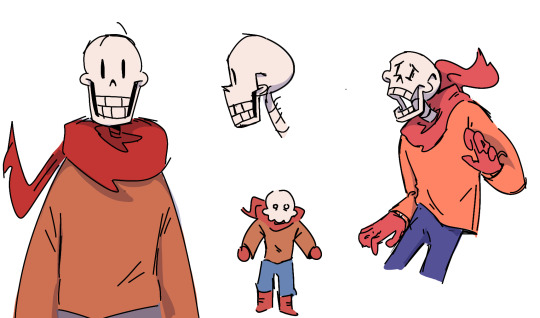

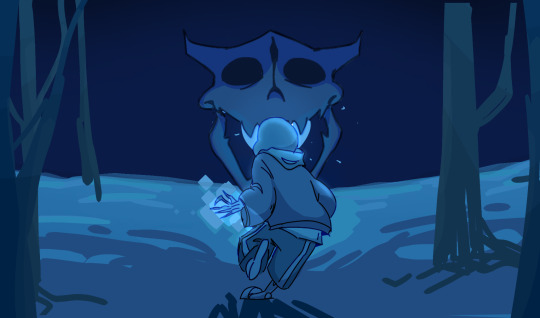
#how did it take me untill the year of our lord 2023 for me to find finaglc#i watched the comic dub 3 years ago and when it ended i was like 'well never gonna get a conclusion to that masterpiece'#BUT I WAS WRONG#IT WAS A FANFIC THIS WHOLE TIME#diabolical#undertale#finaglc#flowey is not a good life coach#flowey#papyrus#sans#gaster blaster#a thorn in my side
136 notes
·
View notes
Note
Jason never got to be 16. makes me sad.
Not to deny that Jason not being able to make it to 16 in his first life is sad, but I mean he did technically end up making it, and he made it to 17 and 18 and 21 and so on and so forth, it just happened "in round two" so to speak.
What I think is sadder though, is that depending on whether he was 15 or 14 years old when this happened:
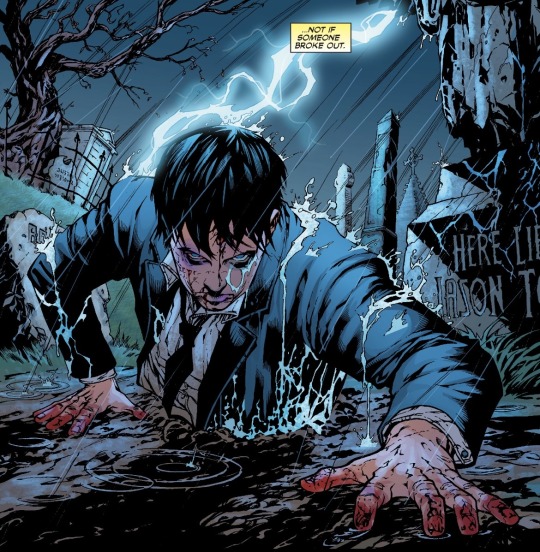



There are one of two ways he would've spent his sixteenth year.
Option 1 (if he was 15 at the time of his ressurection):
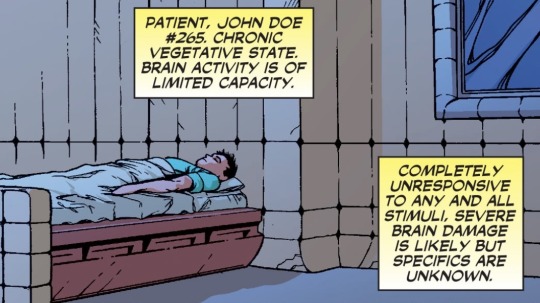
(This is 1 year post initial hospitalization)
Or Option 2 (if he was 14 at the time of his ressurection):
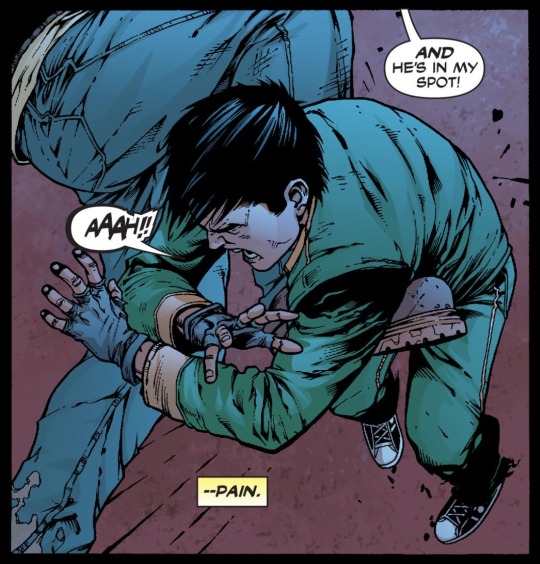

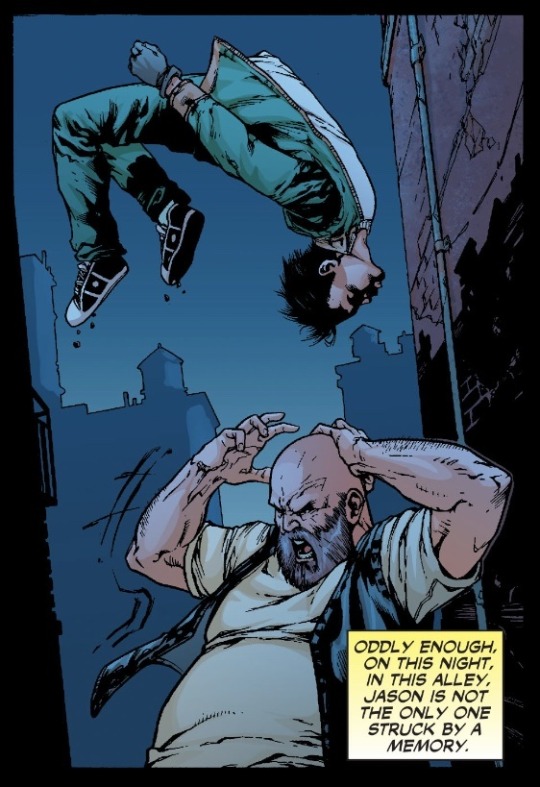
(And this is 2 years post initial hospitalization, 1 year post escape from that facility)
Happy sweet 16th, Jason John Doe #265 :)
Batman Annual (1961-) #25
#edit: phrasing#if he got the chance to go back Jason very likely would have chosen to have never made it to 16 at all#he did mention this verbatim more than once in comics that postdate this one too#his imposter syndrome also appears to be getting more and more severe in each new comic#in conclusion what's sadder is both that he *did* make it to 16 and it was a fate worse than staying dead#*and* that it was never his choice#also part of why I love ditf-Jason so much. it’s about how downright suicidal he is in like every branch#kelseethe#as far as Jason is concerned he got hit by that car within moments of being pulverized exploded and buried#not six months#kinda crazy isn’t it#a bit off-topic but isn't it cathartic how Jason briefly brought stability and order to his beloved Gotham (via harm reduction methods)#after he lived a life full of instability uncertainty and chaos most of which started in Gotham#and Gotham immediately took what little stability he got back/still had away from him as soon as he faced Bruce (talking abt batman 650)#he's just in a constant cycle of trying to help gotham while gotham just cuts his legs out from underneath#<- anyway there's what you get when you send Kelsey an ask#a “mhm yeah anyway *I*-” response lol
25 notes
·
View notes
Text
i love reading peoples' opinions on trigun but sometimes i will see an opinion that is so like. bewilderingly wrong it actually makes me doubt my own interpretation of the source material
#rora rants#AND THIS IS ON ME.#because sometimes i assume something is obvious when maybe it requires a bit more textual analysis#but then sometimes people TEST me and it's like#i need to write my 200k vashwood character study ten times faster clearly#because what in the world are you people talking about#granted i'm not often fully devoted to the most popular ship in a fandom so the experience of people constantly#banging them over the head with pots and pans#isn't a familiar one to me. because usually in the rarepair fandoms people are OBSESSED with the characters in a#really textual analysis way#so you dont get that#unfortunately vashwood is more popular so... more margin of error#and frankly i'm not incredibly picky i can still enjoy things when i dont completely agree with them#some of my favourite vw fics are ones where i'm like he would not fucking say that but... this is so good#but then other times i'm just baffled! because how did you come to that conclusion#sorry HAHAHA i just had to get this off my chest
14 notes
·
View notes
Text
okay but does anyone listen to bronski beat and does anyone GET IT. they released an album, completely unashamedly gay, in the 80s, during the AIDS crisis, during a time of insanely rampant homophobia and over the top conservatism. they released an album with the age of consent for homosexual activity in every european country listed on the sleeve and the phone number for a legal advice hotline for queer people etched into the grooves of the vinyl. they released an album with the opening track dedicated to a hate crime victim, featuring vocals from an openly gay choir. they released an album with songs about homophobic violence, the dangers of following the bible too closely, about leaving behind everything you know and starting over, about homophobic family and homophobic bullying. they wrote about being gay and being proud of it and knowing that there is nothing wrong with who you are. in the face of all the hatred going on in the 80s they released an album that was in-your-face gay and fuck-you queer, and i love them for it.
(see original tags for a lot more commentary)
#bronski beat#for reference : the album is The Age Of Consent#the man the opening track “Why ?” was dedicated to was Drew Griffiths (who according to wikipedia was a#playwright who was victim to a homophobic murder in 1984)#and the choir was The Pink Singers (an openly gay men’s choir in London)#and like yeah. i know this very much centers gay men HOWEVER . considering everything like the time period and#how songs that would’ve been lesbian (see: Voices Carry by Til Tuesday) being basically straight-washed. and also how rampant homophobia wa#(so getting anything even a little gay released was hard bc it was likely to get smashed down by record stores and companies and#radio stations and music reviewers. and us ones particularly )#in this case i don’t care whatsoever and besides they did something absolutely monumental for the whole community if you ask me#as a lesbian i am literally so grateful that this exists and i wasn’t even alive at the time. even now it makes me feel seen.#i cant even imagine what it would’ve been like for a queer kid in the 80s to hear that and maybe know they weren’t alone#so in conclusion: bronski beat i love you forever and jimmy somerville i love you forever
60 notes
·
View notes
Text
okay still on the topic of piercings i currently have the most ATROCIOUSLY infected helix and for the life of me i cannot get the godforsaken jewellery out. i literally bought nylon gloves from home bargains today and im now covered in blood and NO CLOSER TO GETTING IT THE FUCK OUT
#pissed off. the girl i did my law a-level with works at my local piercing shop and ive fully messaged her#like heyyyyy girlie. are you open tomorrow i know it's flooded everywhere but pls pls pls#i mean in the grand scheme it really isnt a bad infection it's a very normal infection and given ive never had a single piercing get#infected before when i know some people whose bodies just reject them every single time i know ive gotten off pretty lucky#but that just means im even more dramatic when it does happen. like i know we know what we're doing at this point come the fuck on#i do like telling people that it's bc it's my american piercing tho. got a piercing one (1) time at somewhere that was not only#not my regular haunt but also in AMERICA and it gets infected. didnt do anything different than any of my others#americans dont know how to pierce ears. it's the only conclusion we can come to given the extensive evidence. sad but true#hella goes home
21 notes
·
View notes
Text
reminder that no matter how bad your take, Reddit always has worse ones

#the way this was 3 paragraphs of dismissing mirabels trauma#it’s an old post but I still think about it constantly#like#HOW DID U COME TO THAT CONCLUSION😭#obviously she wasn’t the only one struggling but it’s so weird to like rank it#ranking the madrigals family trauma!/s#like the way this person did not get that you can say other characters suffered without putting down other ones#encanto#encanto disney#mirabel madrigal#disneys encanto#mirabel encanto
51 notes
·
View notes
Text
"Yona was just added bc Nintendo wants people to stop shipping sidlink!" Literally what the hell are you talking about
#yes nintendo is homophobic. no they do not give a singular shit about what their fanbase does??? what are you talking abouuuutttt#they literally dont care what people do as long as they get money??? like what#listen im upset abt yona having so many unanswered questions. mainly she came from another zora's domain#meaning she came from outside of hyrule. so that leads to a lot of questions.#but howww do you come to the conclusion that she was just added as a 'no homo' indicator#dont even get me started on the people genuinely unironically calling this queerbaiting. what are you onnnnnnn#'and oh but sidon said he used to see her as a sister! so its gross and wrong!' sidon literally thought out loud to links face abt how#had things been different and link had gotten married to mipha he would be his BROTHER IN LAW. SAID THAT OUT LOUD TO HIS FACE. so shh#imo. yona was added for one 'ohh wow exciting new character look at this' and two. as a way for sidon's trauma to be acknowledged#bc it was veeery briefely shown in botw. for like. a singular second if you snuck up on him at mipha's statue#but yona's defining scene in totk was her forcing sidon to confront that he wasn't being himself because of that trauma. and that#he needed to let go of the fear around it. if only temporary. because his people needed him.#so tbh?? sheis very important to the plot. she new mipha. admired her. knows why sidon still struggles with this and#how difficult and frightening everything becomes when he views the world through the lens of 'what if i lose someone again'#like. they added yona for his struggles to be spelled out to the audience even further#so to just boil her down to 'ewww woman gets in the way of my gaybies 😡😡😡'. hello. did you play the game.#do you even know who these characters are. quick gimme ten facts about sidons character that you didnt make up for shipping purposes.pronto
58 notes
·
View notes
Text
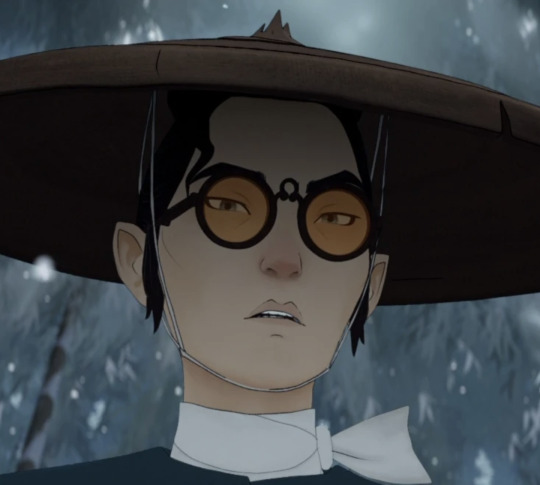
I watched all eight episodes of season 1 of Blue Eye Samurai over the weekend. I then went browsing because I wanted to read some online reviews of the show to see what people were thinking of it and also because I wanted to interact with gifs and art, as the series is visually stunning.
Yet, in my search for opinions on the show, I came across several points I'd like to address in my own words:
Mizu’s history and identity are revealed piece-by-piece and the “peaches” scene with Mizu and Ringo at the lake is intended to be a major character reveal. I think it’s weird that some viewers got angry over other viewers intentionally not gendering Mizu until that reveal, rather than immediately jumping to gender the character as the other characters in the show do. The creators intentionally left Mizu’s gender and sexuality ambiguous (and quite literally wrote in lines to lead audiences to question both) to challenge the viewer’s gut assumption that this lone wolf samurai is a man. That intentional ambiguity will lead to wide and ambiguous interpretations of where Mizu fits in, if Mizu fits in at all. But don't just take my word for this:
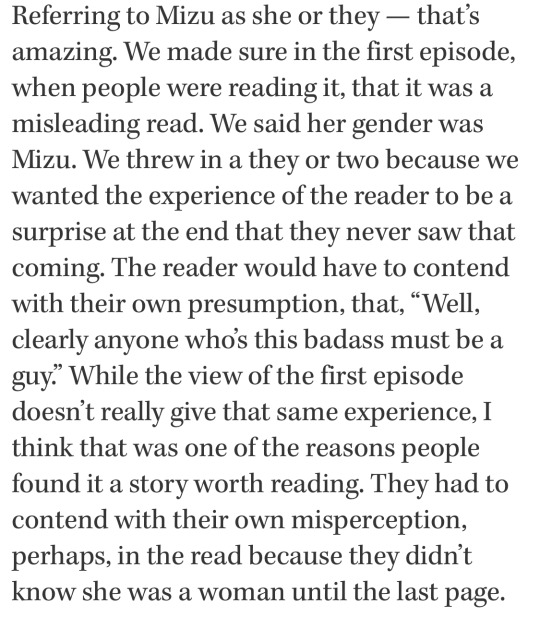
Re: above. I also think it’s weird that some viewers got upset over other viewers continuing to acknowledge that Mizu has a very complicated relationship with her gender, even after that reveal. Canonically, she has a very complicated relationship with her identity. The character is intended to represent liminality in identity, where she’s often between identities in a world of forced binaries that aren’t (widely) socially recognized as binaries. But, again, don’t just take my word for this:
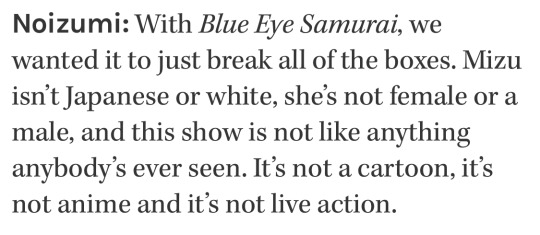
Mizu is both white and Japanese, but she is also not white and not Japanese simultaneously (too white to be Japanese and too Japanese to be white). She’s a woman and a man. She’s a man who’s a woman. She’s also a woman who’s not a woman (yet also not quite a man). But she’s also a woman; the creators said so. Mizu was raised as a boy and grew into a man, yet she was born a girl, and boyhood was imposed upon her. She’s a woman when she’s a man, a man when she’s a man, and a woman when she’s a woman.
Additionally, Mizu straddles the line between human and demon. She’s a human in the sense she’s mortal but a demon in the sense she’s not. She's human yet otherworldly. She's fallible yet greatness. She's both the ronin and the bride, the samurai and the onryō. In short, it’s complicated, and that’s the point. Ignoring that ignores a large part of her internal character struggle and development.
Mizu is intended to represent an “other,” someone who stands outside her society in every way and goes to lengths to hide this “otherness” to get by. Gender is a mask; a tool. She either hides behind a wide-brimmed hat, glasses, and laconic anger, or she hides behind makeup, her dress, and a frown. She fits in nowhere, no matter the identity she assumes. Mizu lives in a very different time period within a very different sociocultural & political system where the concept of gender and the language surrounding it is unlike what we are familiar with in our every-day lives. But, again, don’t just take my word for this:
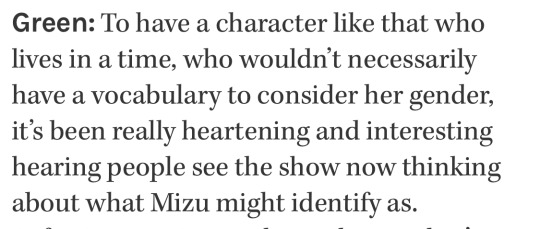
It’s also weird that some viewers have gotten upset over the fact women and queer people (and especially queer women) see themselves in Mizu. Given her complicated relationship with identity under the patriarchy and colonial violence, I think Mizu is a great character for cis-het women and queer folks alike to relate to. Her character is also great for how she breaks the mold on the role of a biracial character in narratives about identity (she’s not some great bridge who will unite everyone). It does not hurt anyone that gender-fluid and nonbinary people see themselves in Mizu's identity and struggle with identity. It does not hurt anyone that lesbians see themselves in the way Mizu expresses her gender. It does not hurt anyone that trans men see themselves in Mizu's relationship with manhood or that trans women can see themselves in Mizu when Mama forces her to be a boy. It's also really cool that cis-het women see themselves in Mizu's struggles to find herself. Those upset over these things are missing critical aspects of Mizu's character and are no different from the other characters in the story. The only time Mizu is herself is when she’s just Mizu (“…her gender was Mizu”), and many of the other characters are unwilling to accept "just Mizu." Accepting her means accepting the complicatedness of her gender.
Being a woman under the patriarchy is complicated and gives women a complicated relationship with their gender and identity. It is dangerous to be a woman. Women face violence for being women. Being someone who challenges sex-prescribed norms and roles under patriarchy also gives someone a complicated relationship with their identity. It is dangerous to usurp gender norms and roles (then combine that with being a woman...). People who challenge the strict boxes they're assigned face violence for existing, too. Being a racial or ethnic minority in a racially homogeneous political system additionally gives someone a complicated relationship with their identity. It is dangerous to be an ethnic minority when the political system is reproduced on your exclusion and otherness. They, too, face violence for the circumstances of their birth. All of these things are true. None of them take away from the other.
Mizu is young-- in her early 20s-- and she has been hurt in deeply affecting ways. She's angry because she's been hurt in so many different ways. She's been hurt by gender violence, like "mama's" misogyny and the situation of her birth (her mother's rape and her near murder as a child), not to mention the violent and dehumanizing treatment of the women around her. She's been hurt by racial violence, like the way she has been tormented and abused since childhood for the way she looks (with people twice trying to kill her for this before adulthood). She's been hurt by state-sanctioned violence as she faces off against the opium, flesh, and black market traders working with white men in contravention of the Shogun's very policies, yet with sanction from the Shogun. She's been hurt by colonial violence, like the circumstances of her birth and the flood of human trafficking and weapons and drug trafficking in her country. She's had men break her bones and knock her down before, but only Fowler sexually differentiated her based on bone density and fracture.
Mizu also straddles the line between victim and murderer.
It seems like Mizu finding her 'feminine' and coming to terms with her 'female side' may be a part of her future character development. Women who feel caged by modern patriarchal systems and alienated from their bodies due to the patriarchy will see themselves in Mizu. They understand a desire for freedom that the narrow archetypes of the patriarchy do not afford them as women, and they see their anger and their desire for freedom in Mizu. This, especially considering that Mizu's development was driven by one of the creators' own experiences with womanhood:
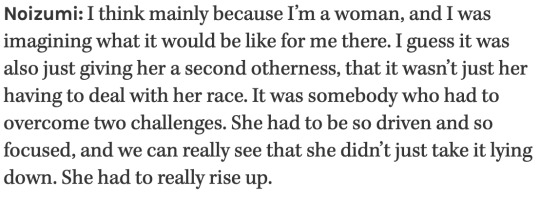
No, Mizu does not pass as a man because she "hates women" or because she hates herself as a woman or being a woman. There are actual on-screen depictions of Mizu's misogyny, like her interactions with Akemi, and dressing like a man is not an instance of this. Mizu shows no discomfort with being a woman or being seen as a woman, especially when she intends to pass herself as and present as a woman. Mizu also shows the women in the series more grace and consideration than any man in the show, in whatever capacity available to her socially and politically, without revealing herself; many of the women have remarked that she is quite unlike other men, and she's okay with that, too.
When she lives on the farm with Mama and Mikio, Mizu shows no discomfort once she acclimates to the new life. But people take this as conclusive evidence of the "only time" she was happy. She was not. This life was also a dance, a performance. The story of her being both the ronin and the onryō revealed to the audience that this lifestyle also requires her to wear a mask and dance, just as the bride does. This mask is makeup, a wedding dress, and submission, and this performance is her gender as a wife. She still understands that she cannot fully be herself and only begins to express happiness and shed her reservation when she believes she is finally safe to be herself. Only to be betrayed. Being a man is her safety, and it is familiar. Being a boy protected her from the white men as a child, and it might protect her heart now.
Mizu shows no discomfort with being known as a woman, except when it potentially threatens her goals (see Ringo and the "peaches" scene). She also shows no discomfort with being known as, seen as, or referred to as a man. As an adult, she seems okay- even familiar- with people assuming she's a man and placing her into the role of a man. Yet, being born a girl who has boyhood violently imposed upon her (she did not choose what mama did to her) is also an incredibly important part of her lived experience. Being forced into boyhood, but growing into a man anyway became part of who she is. But, being a man isn’t just a part of who she became; it’s also expedient for her goals because men and women are ontologically different in her world and the system she lives under.
She's both because she's neither, because- ontologically- she fits nowhere. When other characters point out how "unlike" a man she is, she just shrugs it off, but not in a "well, yeah, because I'm NOT a man" sort of way, but in an "I'm unlike anyone, period," sort of way. She also does not seem offended by Madam Kaji saying that Mizu’s more man than any who have walked through her door.
(Mizu doesn’t even see herself as human, let alone a woman, as so defined by her society. And knowing that creators have stated her future arc is about coming into her “feminine era” or energy, I am actually scared that this show might fall into the trope of “domesticating”/“taming” the independent woman, complete with an allegory that her anger and lack of human-ness [in Mizu’s mind] is a result of a woman having too much “masculine energy” or being masculine in contravention of womanness.)
Some also seem to forget that once Mama and Mikio are dead, no one knows who she is or where she came from. They do not have her background, and they do not know about the bounty on her (who levied the bounty and why has not yet been explained). After their deaths, she could have gone free and started anew somehow. But in that moment, she chose to go back to life as a man and chose to pursue revenge for the circumstances of her birth. Going forward, this identity is no longer imposed upon her by Mama, or a result of erroneous conclusions from local kids and Master Eiji; it was because she wanted people to see her as a man and she was familiar with navigating her world, and thus her future, as a man. And it was because she was angry, too, and only men can act on their anger.
I do think it important to note that Mizu really began to allow herself to be vulnerable and open as a woman, until she was betrayed. The question I've been rattling around is: is this because she began to feel safe for the first time in her life, or is this part of how she sees women ontologically? Because she immediately returns to being a man and emotionally hard following her betrayal. But, she does seem willing to confide in Master Eiji, seek his advice, and convey her anxieties to him.
Being a man also confines Mizu to strict social boxes, and passing herself as a man is also dangerous.
Mizu doesn't suddenly get to do everything and anything she wants because she passes as a man. She has to consider her safety and the danger of her sex being "found out." She must also consider what will draw unnecessary attention to her and distract her from her goals. Many viewers, for example, were indignant that she did not offer to chaperone the mother and daughter and, instead, left them to the cold, only to drop some money at their feet later. The indignity fails consider that while she could bribe herself inside while passing as a man, she could not bribe in two strangers. Mizu is a strange man to that woman and does not necessarily have the social position to advocate for the mother and daughter. She also must consider that causing small social stirs would distract from her goals and draw certain attention to her. Mizu is also on a dangerous and violent quest.
Edo Japan was governed by strict class, age, and gender rules. Those rules applied to men as well as women. Mizu is still expected to act within these strict rules when she's a man. Being a man might allow her to pursue revenge, but she's still expected to put herself forward as a man, and that means following all the specific rules that apply to her class as a samurai, an artisan (or artist), and a man. That wide-brimmed hat, those orange-tinted glasses, and her laconic tendencies are also part of a performance. Being a boy is the first mask she wore and dance she performed, and she was originally (and tragically) forced into it.
Challenging the normative identities of her society does not guarantee her safety. She has limitations because of her "otherness," and the transgression of sex-prescribed roles has often landed people in hot water as opposed to saving them from boiling. Mizu is passing herself off as a man every day of her life at great risk to her. If her sex is "found out" on a larger scale, society won’t resort to or just start treating her as a woman. There are far worse fates than being perceived as a woman, and hers would not simply be a tsk-tsk, slap on the wrist; now you have to wear makeup. Let's not treat being a woman-- even with all the pressures, standards, fears, and risks that come with existing as a woman-- as the worst consequence for being ‘found out’ for transgressing normative identity.
The violence Mizu would face upon being "found out" won’t only be a consequence of being a "girl." Consider not just the fact she is female and “cross-dressing” (outside of theater), but also that she is a racial minority.
I also feel like many cis-het people either ignore or just cannot see the queerness in challenging gender roles (and thus also in stories that revolve around a subversion of sex-prescribed gender). They may not know how queerness-- or "otherness"-- leads to challenging strict social stratifications and binaries nor how challenging them is seen by the larger society as queer ("strange," "suspicious," "unconventional," even "dishonorable," and "fraudulent"), even when "queerness" (as in LGBTQ+) was not yet a concept as we understand it today.
Gender and sexuality- and the language we use to communicate who we are- varies greatly across time and culture. Edo Japan was governed by strict rules on what hairstyles, clothes, and weapons could be worn by which gender, age, and social group, and this was often enshrined in law. There were specific rules about who could have sex with whom and how. These values and rules were distinctly Japanese and would not incorporate Western influences until the late 1800s. Class was one of the most consequential features to define a person's fate in feudal Japan, and gender was quite stratified. This does not mean it's inappropriate for genderqueer people to see themselves in Mizu, nor does this mean that gender-variant identities didn’t exist in Edo Japan.
People in the past did not use the same language we do today to refer to themselves. Example: Alexander The Great did not call himself a "bisexual." We all understand this. However, there is a very weird trend of people using these differences in language and cultures across time to deny aspects of a historical person's life that societies today consider taboo, whether these aspects were considered taboo during that historical time period or not. Same example: people on Twitter complaining that Netflix "made" Alexander The Great "gay," and after people push back and point out that the man did, in fact, love and fuck men, hitting back with "homosexuality wasn't even a word back then" or "modern identity didn't exist back then." Sure, that word did not exist in 300s BCE Macedonia, but that doesn't mean the man didn't love men, nor does that mean that we can't recognize that he'd be considered "queer" by today's standards and language.
Genderqueer, as a word and as the concept is understood today, did not exist in feudal Japan, but the people did and feudal Japan had its own terms and concepts that referred to gender variance. But while the show takes place in Edo Japan, it is a modern adult animation series made by a French studio and two Americans (nationality). Mizu is additionally a fictional character, not a historical figure. She was not created in a vacuum. She was created in the 21st century and co-written by a man who got his start writing for Sex in the City and hails from a country that is in the midst of a giant moral panic about genderqueer/gender-variant people and gender non-conforming people.
This series was created by two Americans (nationality) for an American company. In some parts of that country, there are laws on the book strictly defining the bounds of men and women and dictating what clothes men and women could be prosecuted for wearing. Changes in language and identity over time mean that we can recognize that if Mizu lived in modern Texas, the law would consider her a drag performer, and modern political movements in the show creators' home country would include her under the queer umbrella.
So, yeah, there will also be genderqueer people who see themselves in Mizu, and there will be genderqueer fans who are firm about Mizu being queer to them and in their “headcanons.” The scene setting being Edo Japan, does not negate the modern ideas that influence the show. "Nonbinary didn't exist in Edo Japan" completely ignores that this show was created to explore the liminality of modern racial, gender, class, and normative identities. One of the creators was literally inspired by her own relationship with her biracial identity.
Ultimately, the fact Mizu, at this point in her journey, chooses to present and pass as a man and the fact her presented gender affects relationship dynamics with other characters (see: Taigen) gives this story a queer undertone. And this may have been largely unintentional: "She’s a girl, and he’s a guy, so, of course, they get together," < ignoring how said guy thinks she’s a guy and that she intentionally passes herself as a guy. Audiences ARE going to interpret this as queer because WE don’t live in Edo-era Japan. And I feel like people forget that Mizu can be a woman and the story can still have queer undertones to it at the same time.
#Blue Eye Samurai#‘If I was transported back in time… I’d try to pass myself off as a man for greater freedom.’#^^^ does not consider the intersection of historically queer existence across time with other identities (& the limitations those include)#nor does it consider the danger of such an action#I get it. some come to this conclusion simply because they know how dangerous it is to be a woman throughout history.#but rebuking the normative identities of that time period also puts you at great risk of violence#challenging norms and rules and social & political hierarchies does not make you safer#and it has always been those who exist in the margins of society who have challenged sociocultural systems#it has always been those at greatest risk and who've faced great violence already. like Mizu#Anyway... Mizu is just Mizu#she is gender queer (or gender-variant)#because her relationship with her gender is queer. because she is gender-variant#‘queer’ as a social/political class did not exist. but people WE understand as queer existed in different historical eras#and under different cultural systems#she’s a woman because queer did not exist & ‘woman’ was the sex caste she was born into#she’s also a woman because she conceptualizes herself as so#she is a woman AND she is gender-variant#she quite literally challenges normative identity and is a clear example of what sex non-conforming means#Before the actual. historic Tokugawa shogunate banned women from theater#there were women in the theater who cross-dressed for the theater and played male roles#so I’m also really tired of seeing takes along the lines of: ‘Edo Japan was backwards so cross dressers did’t exist then!’#like. please. be more transparent won’t you?
16 notes
·
View notes
Text
i've seen a few comments before (not on here, just in the past on other sites) frustrated and confused about why the oldest dream never talked to yoo joonghyuk. or anyone for that matter. why couldn't he just say something, anything at all? did he feel nothing as they suffered? couldn't he have helped somehow?
and there's a lot i could say about this and a lot of various layers and details and perspectives. but in the end it all comes down to this:
not a single one of us can talk to the characters in a book we're reading.
that's just how it works.
#mine#orv#orv spoilers#(next part is just my rambling that could be ENTIRELY incorrect its 4AM okay ashdjfg)#in addition here's my hot take: i don't think yjh actually talked to od the one time he said he did#i think he is a little liar who thought the one reason kdj wouldn't kill him is if kdj thought it'd doom the timeline#and he thought kdj wouldn't feel assured unless some higher power than yjh confirmed it would be fine#so he LIED to get kdj to KILL HIM because he and kdj are BIRDS OF A FUCKED UP FEATHER#i'm not saying he lied about knowing the timeline would be fine without him. i just think he reached that conclusion through other means#like. its a perfectly reasonable conclusion to make if you consider that the cut film effect exists.#how are you gonna splice n dice different timelines if one of them doesnt exist anymore once yjh regresses? you CAN'T is the answer#so i think he could be sure the current round/timeline would be fine if he regressed into a new round/timeline even w/o talking to od#anyways. i could be 100% wrong about all that!! i likely am ashjdfg but it's. it sure is something to think about!
42 notes
·
View notes